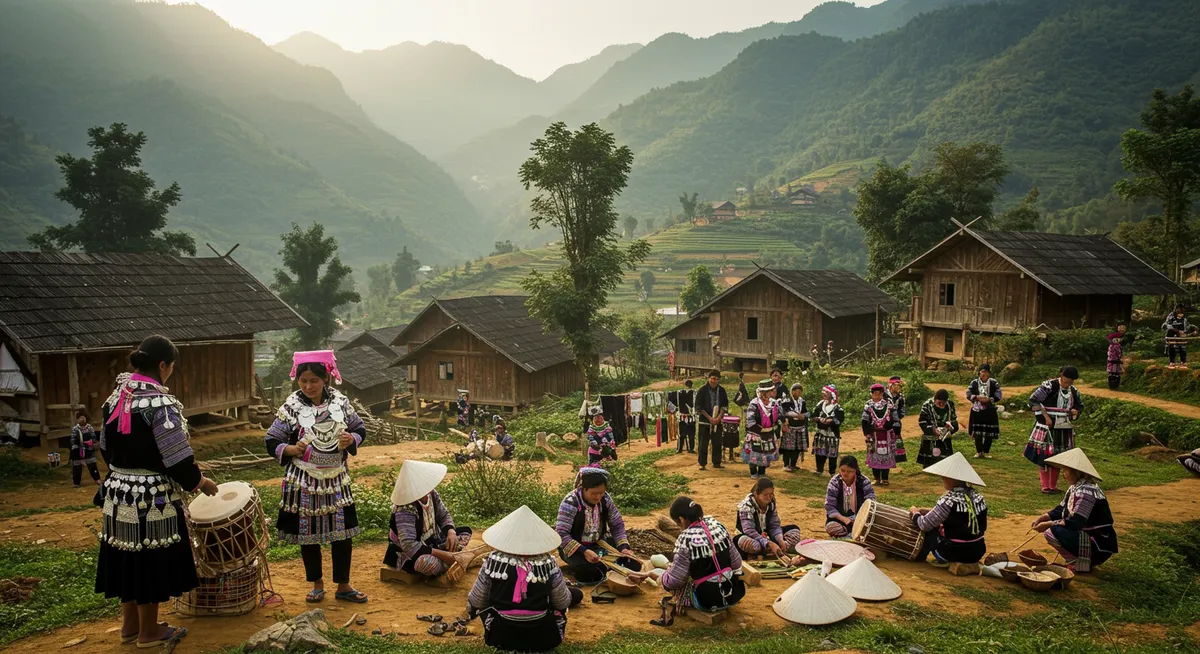
Sapa Cultural Experiences & Ethnic Groups Guide
Table of Contents
Want to find the best travel deals for this destination? Chat with our travel hacking specialist!
Get Travel HacksCategory: sapa-cultural-experiences-and-ethnic-groups
Discover the Rich Tapestry of Sapa's Hill Tribe Cultures
Having personally trekked through Sapa's verdant valleys, I can attest to the profound beauty of its landscapes and, more importantly, its vibrant human tapestry. The region offers unparalleled Sapa cultural experiences and ethnic groups, providing a window into Vietnam's highland traditions. This guide aims to help you understand the indigenous communities that call this breathtaking area home, from their intricate customs to their daily lives. You'll gain insights into how to respectfully engage with these diverse cultures, ensuring your visit is both memorable and meaningful. Exploring Sapa offers a truly unique perspective on local heritage, complementing the wealth of information available on Plan Vacation Asia.
Who are Sapa's Major Ethnic Groups?
Sapa is a melting pot of diverse ethnic minorities, each contributing uniquely to the region's cultural fabric. The most prominent group is the Hmong, comprising both Black Hmong and Flower Hmong, easily recognized by their distinct indigo-dyed clothing and colorful embroidery. Following them are the Red Dao, known for their elaborate headscarves and traditional herbal baths. Furthermore, you'll encounter the Tay, Giay, and Xa Pho people, who also maintain their unique languages, customs, and agricultural practices. These various Sapa ethnic groups have preserved their ancestral ways of life, largely unaffected by modern influences, making every encounter a genuine cultural exchange. For comprehensive planning, consult our Sapa Travel Guide.
Engaging in Authentic Sapa Cultural Experiences
To truly immerse yourself in Sapa's spirit, engaging directly with its local communities is key. Homestays offer an intimate glimpse into daily life, allowing you to share meals and stories with a local family. Many villages, like Cat Cat or Ta Van, welcome visitors for guided tours, often led by community members themselves. These interactions highlight the resilience and warmth of the local people, providing unforgettable cultural experiences in Sapa. Always remember to be a respectful guest, embracing their traditions. I found that learning a few simple phrases in Vietnamese or their local dialect dramatically enhanced my interactions. Consider booking Sapa Trekking Tours that incorporate village visits and homestays for deeper engagement.
Vibrant Markets and Traditional Crafts
Sapa's weekly markets are bustling hubs of activity and central to its cultural identity. The lively Sapa Market and the more expansive Bac Ha Sunday Market are fantastic places to observe the rich **Sapa cultural experiences and ethnic groups** intertwining through commerce. Here, you'll find women from various tribes selling their intricate textiles, hand-embroidered clothing, and silver jewelry. These handicrafts aren't just souvenirs; they represent generations of artistic skill and cultural heritage. You can also discover fresh produce, unique spices, and traditional remedies. My personal tip: visit early to experience the authentic atmosphere before the crowds arrive. Knowing the best time to visit Sapa often coincides with these vibrant market days.
Responsible Tourism: Tips for Visitors
When exploring Sapa, practicing responsible tourism is crucial to preserving the local culture and environment. Firstly, always ask for permission before taking photographs of local people, especially children. Purchasing handicrafts directly from the artisans in villages or markets ensures your money directly benefits the community. Additionally, dress modestly, particularly when visiting temples or local homes. Engage with respect and an open mind; a simple smile and a few learned phrases go a long way in fostering positive interactions. Understanding these nuances contributes significantly to positive Sapa ethnic group experiences. Before your trip, plan your journey effectively by understanding how to get to Sapa from Hanoi.
Frequently Asked Questions
Which are the main ethnic groups living in Sapa?
What kind of cultural experiences can I have in Sapa?
How can I ensure respectful interaction with Sapa's local communities?
Sapa offers much more than stunning landscapes; it's a gateway to incredible Sapa cultural experiences and ethnic groups. From the vibrant markets to the intimate village homestays, every interaction enriches your understanding of Vietnam's highland heritage. By embracing responsible tourism, you contribute positively to these communities while creating unforgettable memories. Immerse yourself in the authentic spirit of Sapa, a truly rewarding journey that will leave a lasting impression.